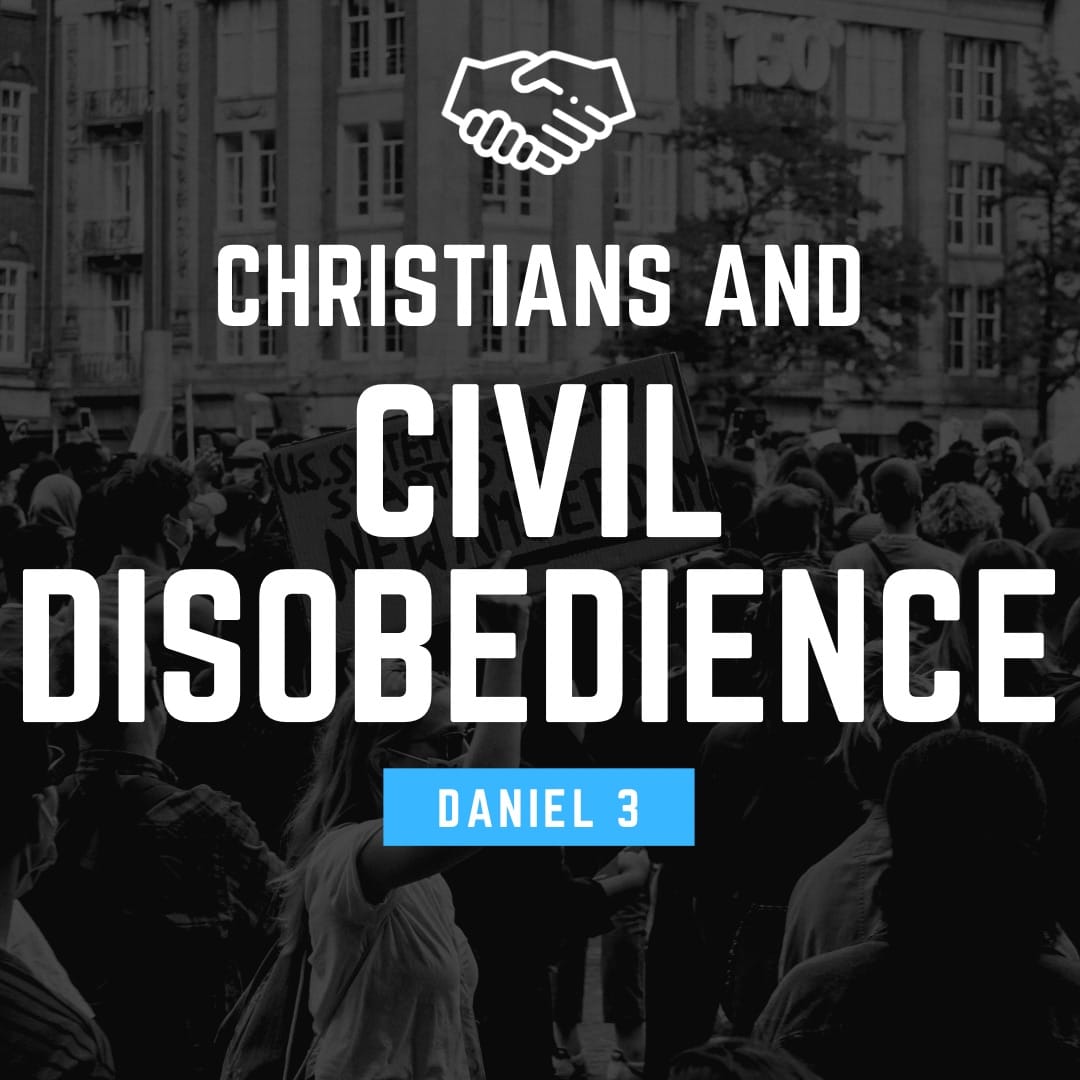Question: Can Christians rebel against their government?
Answer: Yes. It just needs to be for the right reasons and in the right way. Let’s talk about it. (Below are some ways to engage in civil disobedience.)
In Daniel 3, we find an incredible example of civil disobedience rooted in faith. Shadrach, Meshach, and Abednego refused to bow to King Nebuchadnezzar’s golden statue. What makes their defiance so striking is that they weren’t trying to make a scene or lead a rebellion. They simply wouldn’t violate their convictions to appease the government. This pattern offers us a vital framework for understanding how Christians can navigate the delicate tension between obeying earthly authorities and remaining faithful to God.
What Civil Disobedience Is (and Isn’t) for Christians
Civil disobedience, from a Christian perspective, isn’t about rebelling for the sake of rebellion or seeking to create disorder. Romans 13 makes it clear that governing authorities are ordained by God, and our general posture should be one of obedience. However, when laws or mandates conflict with God’s clear commands, the pattern of Scripture teaches us that allegiance to God takes precedence.
Shadrach, Meshach, and Abednego’s stance was firm but respectful. They weren’t stirring up a revolution or challenging Nebuchadnezzar’s entire reign—they simply refused to compromise their worship. Likewise, proper civil disobedience for a Christian is about a refusal to compromise essential tenets of our faith, not a desire to overturn governments or instigate chaos.
The Key Principles of Christian Civil Disobedience
1- Faithfulness Over Fear
The three Hebrews could have bowed to the statue out of fear for their lives. After all, the penalty for refusal was death by fire. But their trust in God allowed them to stand firm. They recognized that the authority of God overruled the king’s demand for idolatry. Christians today should take this to heart: when pressured to violate God’s Word, our loyalty must be to Christ, regardless of the earthly consequences.
2- Peaceful Resistance
Shadrach, Meshach, and Abednego didn’t form a protest or attempt to mobilize a larger group. They simply declined to obey a command that would compromise their faith. Their example shows us that civil disobedience doesn’t require loud or violent resistance. Often, the most powerful testimony comes from quiet, unwavering faith in the face of injustice.
3- Willingness to Suffer for Faith
When the three Hebrews refused to bow, they fully expected that they might be thrown into the fiery furnace. But their words demonstrate their resolve: “Our God whom we serve is able to deliver us…but if not, let it be known to you, O king, that we do not serve your gods” (Daniel 3:17-18). Proper Christian civil disobedience includes the readiness to face consequences with grace and faith, knowing that ultimate justice belongs to God.
4- God’s Deliverance is Sovereign, Not Guaranteed
In Daniel 3, God chose to deliver Shadrach, Meshach, and Abednego in a miraculous way. But they didn’t bank their decision on being saved—they made their choice knowing that even if God didn’t rescue them, they would still remain faithful. As Christians, our obedience is driven by faithfulness to God, not the expectation of a favorable outcome. We know that God will take care of either by delivering us from trouble, or deliver us through trouble.
Applying This Today
In modern society, the Christian’s call to civil disobedience may arise in various contexts: whether laws compel participation in actions that violate biblical teachings, or when we are pressured to accept norms contrary to the faith. But the lesson from Daniel 3 is clear: our response should not be one of anger or a desire to upend authority, but a peaceful, resolute commitment to obedience to God.
- Know God’s Word: We must be clear on where God’s commands stand, particularly in matters of worship, life, and moral convictions.
- Pray for Wisdom: Civil disobedience isn’t a decision to take lightly. We should pray for wisdom, asking God for guidance on when and how to stand firm.
- Be Ready to Suffer: There may be real consequences to refusing to comply with unjust or ungodly demands, and we need to prepare our hearts to suffer well if that’s what faithfulness requires.
- Show Respect for Authority: Even as we stand firm, we should do so with respect and honor toward the governing authorities. Shadrach, Meshach, and Abednego addressed Nebuchadnezzar with courtesy, even as they defied his command.
What can it look like?
- Prayer, Prayer, Prayer: As Christians, we believe ultimate authority comes from God. So, before talking to local government, talk to our Divine Sovereign. Prayer truly changes things.
- More Conversations, Not Less: The way to cause change is not to “draw lines in the sand” and ignore each other. As Christians, we should be the ones to go first in keeping the lines of communication open. This is why it is important to know what you believe and why you believe it. You can listen without agreeing with what is being said.
- Less Emotion, More Resilience: So many times, a situation is made worse by emotion. When our emotions walk in, common sense walks out. As Christians, our desire for change is because we want to glorify God in all things. Therefore, we cannot be governed by our emotions.
- Attending city meetings to voice concerns: Posting things only on social media does little good. If you want to bring change, start by going through the systems our government has in place. Voice your concerns with those have been elected to public office in the proper public forums.
- Voting: The great thing about a democracy is that we can vote. Is all voting fair? That is another conversation for another day. However, nothing is made better by not voting. If you feel those you have elected are not representing your values, vote them out and someone else in.
- Run for Office: If you want to see change, get involved. Support your local representatives. If you don’t have one who aligns with your values and you feel strongly enough about it, run for office.
- Boycott: If a company does not align with your values, you are not required to do business with them. Find someone who does and stand with them. This also gives you an opportunity to know your community and support local businesses.
- Peaceful Protest: Protesting has been a form of civil disobedience for many years. The challenge is how to do it. The goal is not to disrupt or endanger the innocent. The goal is to show unity over an issue. The moment it goes from unity to destruction, the thread has been lost. Peaceful protests should only be engaged when all other avenues have been attempted. This is mainly because an organized group of concerned citizens can quickly turn into a mob. Mobs almost universally fail to do good. This is why a peaceful protest should always be a last resort and highly organized. It’s so unpredictable that it is usually not recommende.
In Daniel 3, the courage of Shadrach, Meshach, and Abednego gives Christians a model of faithful civil disobedience. They stood firm in their convictions without seeking to overthrow the system, understanding that their ultimate allegiance was to God, not man. As believers today, we are called to this same standard: to obey governing authorities unless their commands force us to disobey God. When that time comes, may we stand firm, peaceful, and faithful, trusting that God is with us—even in the fire.



